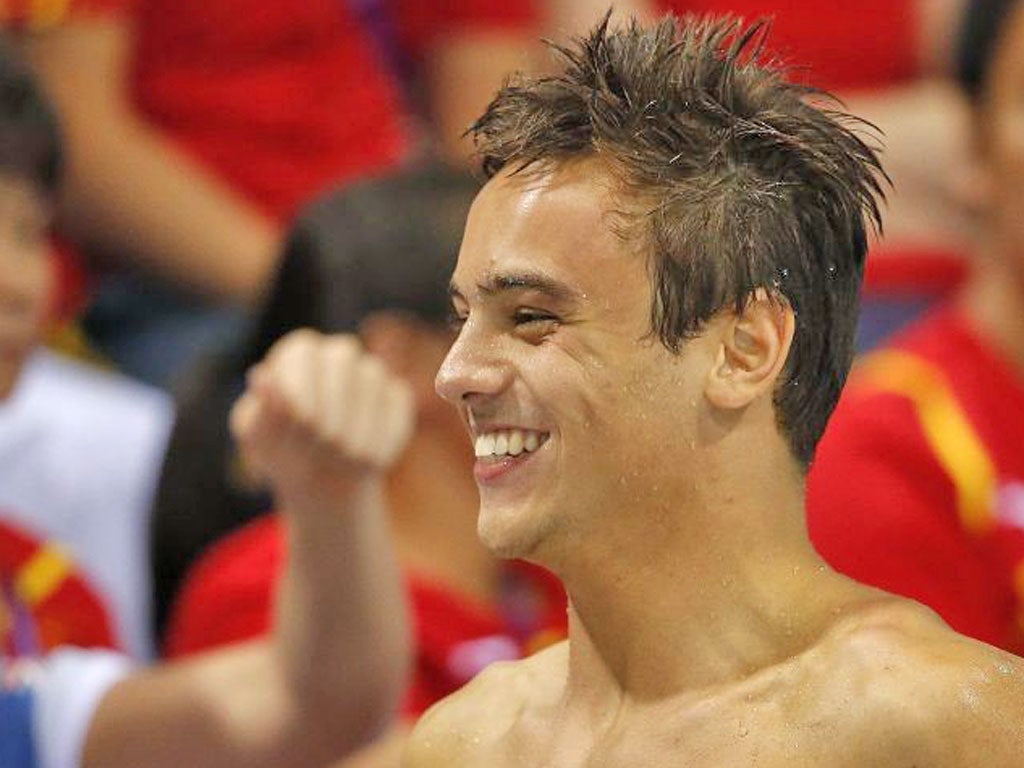James Lawton: For all the long-distance glory, Tom's bronze was even more remarkable

If you wanted to spend the last 24 hours of the Olympics in superior company while pursuing maybe some final definition of the superb contribution made by British competitors, there could be no better companions than Mo Farah and young Tom Daley.
In their quite separate ways, they coloured those last hours with a hard and beautiful commitment.
Though Farah's achievement was overwhelming in its emotion and historic significance – after all, he ran into the club of such distance- running legends as Emil Zatopek, Vladimir Kuts, and Miruts Yifter with his gold medals in the 10,000m and 5,000m – in some ways Daley's bronze in the 10m platform diving was more remarkable.
Certainly, it was more surprising because Farah went to the starting line already installed as a national hero, an object of vast affection and respect, and carrying the confidence of Sebastian Coe, arguably the nation's greatest track hero.
Daley climbed the steps to his destiny at the most troubling point in a young and celebrated but also distinctly tumultuous life.
At 18, four years after finding himself in a vortex of pressure and potentially killing disappointment in Beijing and so soon after the death of his beloved father, the idea of any kind of medal seemed fanciful. That he won bronze, and at one intoxicating moment near the end, threatened to collect gold, was not so much an achievement as a fully fledged resurrection.
Talking with him late on Friday night, after a nightmarish first qualification series which saw him scrape into the semi-finals in 15th of 18 available places, all the promise of a gilded – and highly profitable – early youth seemed to be rooted in a distant past.
He complained of soaring expectations, suggested that the five-ring symbol of the Olympics had come off the wall with the purpose of choking him. He didn't like the long waits between the dives of 32 contenders, his legs felt tired and it had been too late in the night to have been competing for such huge stakes. He seemed, frankly, out of time and out of hope.
Before the Olympics he said that he had the gift of focus and that he understood – perhaps even better than the phenomenal Qiu Bo of China, who hadn't been beaten for two years and who, almost unbelievably, surrendered the gold to the American David Boudia on Saturday night – that you could never go beyond the imperative of concentrating utterly on the next time.
"I like pressure, I can use it for my benefit," Daley claimed. On Friday, it seemed like the forlorn bragging of a dislocated boy. Yet 24 hours later it carried the glow of hard prophecy.
Farah, of course, has no disposition to boast or to colour any issue but the implacable need for the kind of relentless hard work which produced a second stunning success around about the time Daley was remaking the possibilities of his future.
Farah wasn't always some ultimate rider of a Chariot of Fire. He was banished to the sidelines in Beijing without making the final.
If he had talent it was maybe not of the highest order and, certainly, it would not do without a massive increase in commitment.
So Farah went to America, as British fighters were once urged to do if they ever wanted to know about the entrails of the professional game, and under the guidance of the fine distance runner Alberto Salazar he brought himself to an entirely new level of performance on the Oregon coast.
It was an investment in his future that has not only made his career, and the future of his rapidly expanding family, but also opened up new dimensions for any British runner prepared to make the same sacrifices, do the same level of work.
That was the insistent theme of Farah at the moment of his supreme triumph, when the Olympic Stadium called his name and relished so much his celebrations alongside the hero of the world, Usain Bolt.
He said if you grafted, if you saw your target clearly, you might just achieve anything you desired.
Daley's greatest wish, he made clear before a draining ambush in his first event at the start of the Games, the synchro diving in which he partnered Peter Waterfield, was to win gold. But by Saturday night his ambitions were much lower slung. What he needed most was a degree of survival, a whiff of credibility.
That came with the bronze which might well have been weighed as gold. It was the evidence that in the worst of his times he was prepared to stand and fight. He did it from that elevated point on the deck which at times must have had the ambience of a prison cell.
His escape was not easily achieved but it had the supreme merit of an imperilled young man holding his nerve.
Farah led the way, gloriously, and Daley dived at his heels. You couldn't have wished for a more uplifting outcome.
Subscribe to Independent Premium to bookmark this article
Want to bookmark your favourite articles and stories to read or reference later? Start your Independent Premium subscription today.

Join our commenting forum
Join thought-provoking conversations, follow other Independent readers and see their replies